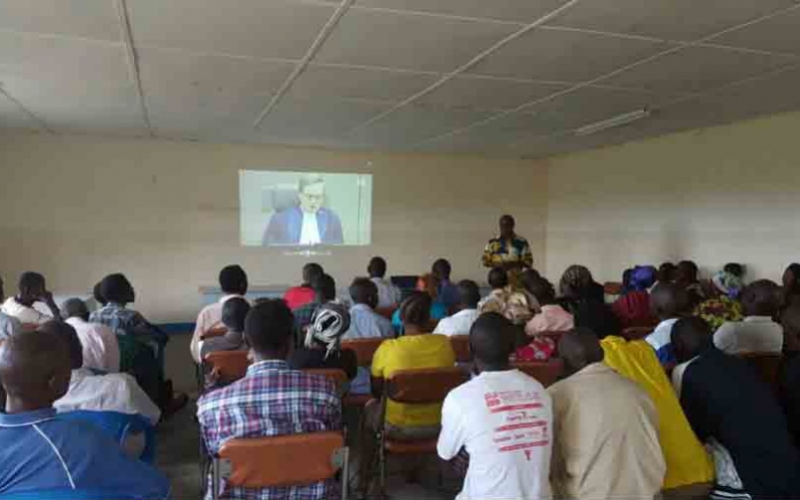Katanga: Reactions to landmark ICC reparations for victims

On 24 March 2017, ICC Judges decided that the material, psychological and physical harm suffered by victims covered by the 2014 ICC conviction of Germain Katanga amount to USD 3,752,700 in damages. The judges deemed Katanga personally liable for USD 1 million of the overall reparations award, and assessed that 297 victims would individually receive symbolic compensation in the amount of USD 250.
The rest of the award will go toward collective reparations, or long-term projects covering entire affected communities in the DRC's Ituri district. The Trust Fund for Victims (TFV) is now tasked with developing a plan to ensure that the reparations award achieves justice for both individuals and their communities, including by supporting housing, education and work opportunities.
Reparations award follows 2014 conviction
Germain Katanga was convicted in 2014 of playing a pivotal role in the planning and execution of a 2003 attack on the village of Bogoro in eastern DRC. At least 200 civilians are thought to have been killed during the attack. Following a four-year trial, the ICC found Katanga guilty of one count of crimes against humanity (murder) and four counts of war crimes (murder, attacking a civilian population, destruction of property and pillaging) and he was sentenced to 12 years' imprisonment.
"The reparations regime of the court is without real precedent," said TFV Executive Director Pieter de Baan. "It's not science. It's basically trying to reach an estimation of what the harm has been in relation to the crimes."
What's everyone saying?
A statement from the International Criminal Court clarified how the reparations will be divided:
"The order provides for two types of reparations: individual reparations, awarded to individuals to repair the harm they have suffered; and collective reparations, consisting of long-term projects covering a whole community but still focusing on individual victims to the extent possible."
For ICC Prosecutor Fatou Bensouda the decision marks a victory in the fight against impunity:
"My own motivation was to show and send a strong and loud message that these kind of crimes [...] will be taken seriously by my office and something will be done about it."
Jean Bosco Lalo, coordinator for the Ituri Civil Society Group stated the importance of reparations in helping the community in Bogoro achieve some measure of closure following the 2003 attack:
"Given that today the victims and the executioners are living together, we must help people reach a real reconciliation."
Dismas Kitenge, president of Congolese human rights defence organization Groupe Lotus, highlighted the significance of a first ICC reparations order recognizing individual harms, as well as the urgency of the award:
"It recognises for the first time both the individual and collective harm suffered by the victims and their right to reparations. We now call on the Trust Fund for Victims and to the ICC to implement the plan as soon as possible so that the victims finally receive the remedies that are owed to them.”
Serge Ngabu, Ligue pour la Paix, les Droits de l’Homme et la Justice Comité Exécutif (LIPADHOJ) Director of Legal Affairs, added:
"In order to maintain social cohesion and appease the victims who have been granted collective reparations, I urge them to take collective redress that takes into account individual interests."
What comes next?
TFV Executive Director Pieter de Baan, who travelled to Bogoro last month to consult with community leaders, shared residents' insistance on education for their children and vocational training for themselves - while highlighting the importance of managing expectations:
“It’s important that any award money, who gets it, how it is spent in the community is well understood and accepted.”
President of the Association Africaine de Defense des Droits de l’Homme (ASADHO), Jean-Claude Katende, took the reparations order as an urgent reminder for the DRC government to address its own responsibility toward reparations initiatives going forward:
“It is urgent that the DRC finally listens to the requests for reparation by the victims. The government must abolish the payments of 'proportional rights' as a prerequisite for receiving compensation… It is time for a comprehensive reparations policy to be implemented by the Congolese government for the victims of the conflict.”
Eloi Urwodhi of LIPADHOJ similarly stressed the crucial role that the country's own authorities can play in developing and implementing the TFV's expected reparations plan:
"Since the Germain Katanga case concerns the situation in the DR Congo, I urge national and local Congolese authorities to maintain a significant contribution in the execution, facilitation and concretization of reparations to victims and especially in the development of the environment of affected communities. They must implement projects that slow down or put an end to the miserable poverty that is currently at breaking point."
The TFV is expected to present its reparations implementation plan by 27 June 2017.
